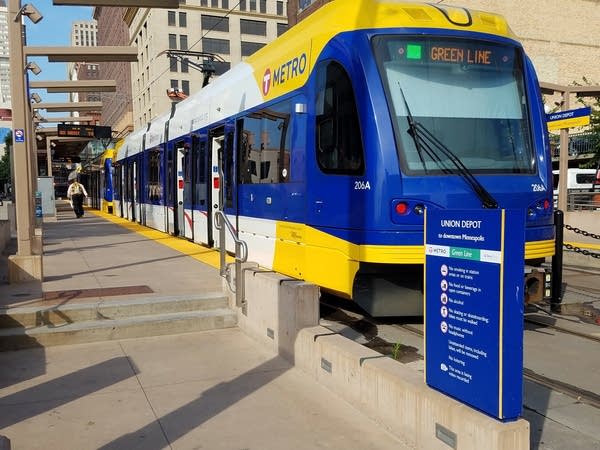Money complicates effort to break up transit alliance

The old song says breaking up is hard to do, and five counties that pooled their transit funding efforts in 2008 are finding it's true.
Hennepin, Ramsey, Dakota, Anoka and Washington counties were all part of the Counties Transit Improvement Board, or CTIB, set up to establish and collect a quarter cent sales tax for transit development and operating subsidies for five different transit lines.
But since then, CTIB's funding partner, the state of Minnesota, has proven reluctant to spend more, on trains in particular. Republican legislators have questioned the value of rail projects in the Twin Cities.
That has the five counties looking to strike out on their own.
Create a More Connected Minnesota
MPR News is your trusted resource for the news you need. With your support, MPR News brings accessible, courageous journalism and authentic conversation to everyone - free of paywalls and barriers. Your gift makes a difference.
"There are significant benefits to each county around the table to dissolving CTIB," said board chairman and Hennepin County commissioner Peter McLaughlin, at a meeting Wednesday.
A breakup would allow the participating counties to double an existing transit sales tax, to half a cent, expected to raise an additional $60 million in Hennepin and $26 million annually in Ramsey county. The law enabling CTIB had capped that tax, but only for participating counties.
More than 80 other counties in Minnesota have had a half cent optional tax and officials say about two dozen already have used it. Dakota, Anoka and Washington counties aren't contemplating such a move so far.
But the effort got off track: the dissolution requires unanimous agreement among all five counties, which haven't been able to reach a consensus so far.
Dakota County officials contended the breakup would divide up CTIB's payouts in a way that left their county $29.1 million short compared to the tax revenue they put into the joint powers agreement. A last minute compromise offered by Hennepin County Wednesday gave Dakota nearly $14.8 million more, and Washington got an additional $1.5 million.
"We've got a pot of money we're dealing with. It doesn't belong to any of us specifically," said Dakota County commissioner Tom Egan. "We also know there is a very significant disparity on the return on investment between the counties," noting a gap between the taxes Dakota County has paid and the transit funding it got from CTIB.
He and fellow county commissioner Mary Liz Holberg voted against the dissolution. That could potentially kill the deal, since each county board has to formally ratify the breakup, in addition to a simple majority vote by CTIB's governing board of county officials.
Holberg said her colleagues weren't willing to haggle.
"Our board had a discussion yesterday, and I was given unanimously strict marching orders. There wasn't a member of the board yesterday that was willing to authorize support of anything less than $29.1 million," Holberg said of the $14.8 million compromise. She also said that private discussions among CTIB members last week were closer to what Dakota County was asking.
"There is no pot of gold," McLaughlin said. He noted that Dakota would have to keep contributing to the partnership through next year, when the county said it was exercising a unilateral withdrawal from CTIB without dissolving the relationship. He said Dakota County stood to access $50 million in additional revenue and foregone contributions to CTIB if they agreed to the dissolution.
Ramsey County is planning a public hearing on the additional sales tax on Tuesday, even though the failed dissolution may mean they can't impose it. Holberg, the Dakota County commissioner, said her county may look to lawmakers at the state Capitol to settle the dispute, regardless of what CTIB members want from the breakup.